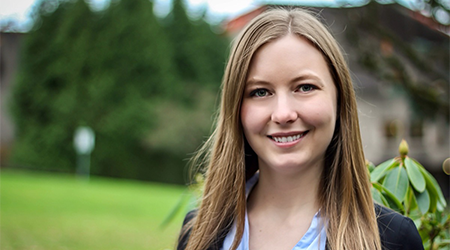Class of 2016
Hometown: Calgary, Alberta

Why did you decide to pursue a career in genetic counselling?
I have always been interested in science, and genetics in particular. It was important for me to find a career with a foundation in genetics, and the opportunity to be involved in research. At the same time, I find it most rewarding to work in a setting where I can help others by providing education and emotional support. Genetic counselling is unique in that it combines my interest in genetics with my desire to be in a profession where my primary role is to help and support others.
How did you hear about genetic counselling?
I first learned about genetic counselling as a teenager, when I had an appointment with a genetic counsellor regarding a condition that runs in my family. At the time, I had no idea what genetic counselling was, and I didn’t understand why I needed to see a counsellor—I just wanted to have genetic testing! The session ended up being very different from my expectations, and I have been interested in the career ever since.
What attracted you to UBC’s two-year Genetic Counselling Program?
The UBC Genetic Counselling Program puts an emphasis on clinical experience. I prefer a more “hands-on” approach to learning, so this was very appealing to me. Clinical rotations start right at the beginning of the program, but learning is fairly balanced between classes and clinical work in first year. By second year, clinical rotations become our primary focus, which means that we spend most of our time directly involved in patient care.
How did you prepare for the application process and interviews?
After completing my Bachelor’s degree, I spent time working as an intake counsellor to further develop my counselling skills. As the application deadline approached, I set up meetings with genetic counselling students and genetic counsellors to learn more about the program and the career. I also found it helpful to read blogs, news articles, and websites about genetic counselling.
What’s one piece of advice you would offer to prospective applicants interested in joining UBC’s program?
Learn as much as you can about the field of genetic counselling. Genetic counsellors can have a variety of different roles, from working in a clinic to working in a laboratory or research setting. I think it’s worthwhile to gain an appreciation of these different roles and specialties, as well as the unique responsibilities, challenges, and ethical issues that come along with them. Doing so will not only help you decide if this career is the right fit for you, it will also help you prepare for the application and interview.
What did a ‘typical day’ look like during your second year in the program?
In second year we had very few classes, and most of our time is devoted to clinical rotations. This means that on a typical day I was seeing patients in the Medical Genetics clinic. Before each appointment, I spent time reading through the patient’s chart, researching genetic conditions, and developing a plan for the session. My supervisor would join me for the appointment, but often I would lead most or all of the session. Once the session was done, I would complete follow-up work such as writing consult letters and calling patients to go over test results. In the evenings, I usually spent time working on my Directed Studies research project.
Looking back, what was the biggest highlight from your time in the program?
The biggest highlight of the program was my five great classmates. The program is difficult, and it really helped to be part of such a supportive group. We spent a lot of time together both in school and in our free time, and I’m sure our friendships will continue long after we graduate.
What are you doing now?
I am now working at an outreach clinic in southern Alberta.







